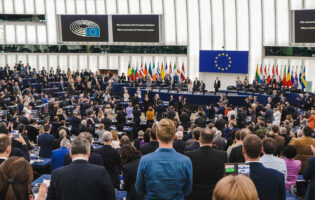Merkel’s Summit

Alexander Privitera
AGI Non-Resident Senior Fellow
Alexander Privitera a Geoeconomics Non-Resident Senior Fellow at AGI. He is a columnist at BRINK news and professor at Marconi University. He was previously Senior Policy Advisor at the European Banking Federation and was the head of European affairs at Commerzbank AG. He focuses primarily on Germany’s European policies and their impact on relations between the United States and Europe. Previously, Mr. Privitera was the Washington-based correspondent for the leading German news channel, N24. As a journalist, over the past two decades he has been posted to Berlin, Bonn, Brussels, and Rome. Mr. Privitera was born in Rome, Italy, and holds a degree in Political Science (International Relations and Economics) from La Sapienza University in Rome.
Rarely has one of the recent European crisis summits had as little impact on the public mood as the one just concluded in Brussels on Monday of this week. Reactions to the decision on the tight fiscal pact were generally muted. Most commentators on both sides of the Atlantic described the results as largely anticipated. Markets are still holding their breath, but for entirely different reasons. They are anxious about the outcome of the ongoing discussions focused on reducing the Greek debt burden. Furthermore, the markets are much more interested to learn whether Germany will eventually put more money on the table to boost the firewall needed to contain the crisis once and for all. Neither topic was part of the agenda at the meeting on Monday. As to the fiscal compact, markets shrugged. It was already priced in. Not surprisingly, the results of the summit have quickly become yesterday’s news.
However, the latest round of high-level gatherings was a success that German Chancellor Angela Merkel badly needed in order to allow her to make some very controversial decisions in the coming weeks. In fact, for Merkel − at a time when Germany’s strategy in dealing with the crisis is being questioned by an increasing number of European partners − the main purpose of finalizing the fiscal pact was to boost her image domestically. After the latest summit, she can claim that she is still the dominant crisis manager in the European Union (EU). Judging from the headlines in German tabloid newspapers – including the popular ‘Bild Zeitung’ showing a German eagle with bulging muscles – she managed to do what she set out accomplish.
In order to make the summit a total success, or what she calls a “masterpiece”, Merkel had to make sure that her demands for stringent fiscal discipline were not diluted by new financial commitments to various rescue funds. Her key European partners in this phase of the crisis, French President Nicolas Sarkozy and Italian Prime Minister Mario Monti, obliged. This was Merkel’s moment and they made no attempt to steal the limelight. Brussels provided a rare picture of harmony, only slightly disturbed by a last minute tussle with Poland and a surprising withdrawal of support by the Czech Republic for the new pact.
However, it is important to view the decision on the fiscal compact for what it really is: the opening shot of a carefully orchestrated strategy that will unfold in the coming months designed to restore confidence in the long term viability of the common currency. One crucial player is the European Central Bank (ECB), of course. But officially, the ECB will keep its focus on avoiding a squeeze in the credit system. Dealing with the sovereign debt crisis is up to European political leaders, in particular Angela Merkel. The Chancellor is well aware of the fact that selling the next steps domestically will be increasingly challenging.
The first element of such a strategy is a deal with Greece that would keep the country within the euro zone but would turn it into a long-term recipient of European financial help. The debate among leading members of the ruling coalition in Germany about whether to force the government in Athens to cede control over its budget decisions to a special EU commissioner only shows how hard it has become to swallow the Greek pill. But despite deep frustration amongst German politicians, there is no doubt that the coalition in Berlin will rally behind Merkel. And although she too wants to prevent others from following Greece’s bad example, she has come to the conclusion that a Greek collapse would still have a destabilizing effect on the rest of the euro zone. In fact, Merkel has no intention of forcing Greece out of the club.
Secondly, Merkel is traveling to China this week to raise money for the International Monetary Fund (IMF). The Fund’s financial strength should grow dramatically in the coming months in order to deal with the global fallout from the euro crisis. The basic message to the Chinese leadership, wrapped in more diplomatic packaging, will be the following: this is a crisis that started in the United States and has now enveloped Europe, but it could soon move over to the emerging economies. Nobody is immune. Europe will commit between 150 to 200 billion euros to the Fund in order to turn it into a more effective global fire brigade. Now it is Beijing’s turn to open their wallet.
The objective is to raise a total of 500 billion euros. But Merkel is well aware that China and others will only commit more money to the IMF if Europe itself shows more willingness to strengthen its own firewall.
Which brings us to our third point: the Chancellor will have to assure her Chinese counterparts that she is about to agree to boosting the combined force of the bailout funds, the European Financial Stability Facility (EFSF) and the European Stability Mechanism (ESM). According to the Financial Times Germany, the cap on the two funds could be raised from 500 billion euros to a trillion. A decision on this crucial step can be expected in March. Monti and, in particular, Sarkozy, who have pressed the Chancellor to agree to such a move, seem confident that she will act. Judging from their behavior in Brussels this week, they have already received assurances from the Chancellor. Klaus Regling, the current German head of the EFSF could become the boss of its successor, the ESM. The bailout fund will in effect become a European Monetary Fund with financial firepower that would exceed that of the Washington based IMF. Making sure that a German is awarded the top position would ease the Chancellor’s job of selling additional German financial commitments domestically.
Last but not least, once all of these elements are in place, Merkel will hit the French campaign trail at Sarkozy’s side. It is unprecedented that a European leader would so blatantly take sides in another country’s national elections. It is a measure of how closely intertwined domestic and European affairs have become. Sarkozy will try to turn the election into a referendum on Europe. If what he gets from Merkel is more than just a few warm words of support, his chances of painting his main opponent, Francois Hollande, as a danger for France and for Europe, could gain some traction. Sarkozy might win a second term, and Merkel could paint herself as Europe’s ultimate savior. Achieving that goal could propel Merkel into a third term in German elections due in late 2013.
Am I suggesting that events will unfold in exactly this fashion? It’s unlikely. In real life, nothing ever goes exactly according to plan. Arguably, this one has a lot of moving parts that could quickly turn into stumbling blocks. But at the very least, the squabbling amongst European leaders appears to have abated for now. They are trying to regain the upper hand and show financial markets how determined they are to get ahead of the curve and restore confidence in the common currency. But the fact that the first test for this strategy is Greece is troubling. Last time Athens’ partners thought they had agreed on a good working plan, Greece threw everybody off balance and bond markets plunged. Merkel can only hope that this time things will be different.









